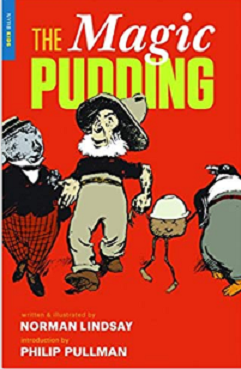The Magic Pudding, by Norman Lindsay
Aug 26
2019

Norman Lindsay's 1918 novel The Magic Pudding is proof positive of my theory that Australian fiction—even their fiction for children—is not for the faint of heart. It centers around the Magic Pudding, a rude, sulky, anthropomorphic dessert, and the three friends who form the Noble Society of Puddin'-Owners: Bunyip Bluegum (a koala), Sam Sawnoff (a penguin), and Bill Barnacle (a sailor). The Magic Pudding never seems to lessen, no matter how many times you slice it, so it is constantly being targeted by pudding thieves, who find its deliciousness more enticing than its off-putting personality.
With The Magic Pudding, Lindsay set out to write a book about food and fighting. There are no morals (other than “don't steal puddings”), no female characters, and, while this particular edition edits out the author's blatant antisemitism, it's still there in the original text. There is nothing redeeming about this story apart from the charm of its characters, the cheery lunacy of its plot, and the genius of Lindsay's language, which includes passages like this one:
With The Magic Pudding, Lindsay set out to write a book about food and fighting. There are no morals (other than “don't steal puddings”), no female characters, and, while this particular edition edits out the author's blatant antisemitism, it's still there in the original text. There is nothing redeeming about this story apart from the charm of its characters, the cheery lunacy of its plot, and the genius of Lindsay's language, which includes passages like this one:
“What d'yer mean, playin' such bungfoodlin' tricks on a man at breakfast?” roared Bill.Admittedly, I don't know many children with this kind of vocabulary, but this would be a great family read-aloud book, as long as you don't mind stopping every twenty seconds to explain what words like “unseemly” and “boisterous” mean... and, of course, your kids aren't the kind of impressionable youths who might decide that any of the scenes in this book need to be acted out.
“What d'yer mean”, shouted the Puddin', “playing such foodbungling tricks on a Puddin' being breakfasted at?”
“Breakfast humor, Bill, merely breakfast humor,” said Sam, hastily.
“Humor's humor,” shouted Bill, “but puddin' in the whiskers is no joke.”
“Whiskers in the Puddin' is worse than puddin' in the whiskers,” shouted the Puddin', standing up in his basin.
“Observe the rules, Bill,” said Sam hurriedly. “Boisterous humor at the breakfast table must be greeted with roars of laughter.”
“To Jeredelum with the rules,” shouted Bill. “Pushing a man's face into his own breakfast is beyond rules or reason, and deserves a punch in the gizzard.”
Seeing matters arriving at this unpromising situation, Bunyip Bluegum interposed by saying, “Rather than allow this happy occasion to be marred by unseemly recriminations, let us, while admitting that our admirable friend, Sam, may have unwittingly disturbed the composure of our admirable friend, Bill, at the expense of our admirable Puddin's gravy, let us, I say, by the simple of act of extending a hand of friendship, dispel in an instant these gathering clouds of disruption. In the words of the poem--
'Then let the fist of Friendship
Be kept for Friendship's foes.
Ne'er let that hand in anger land
On Friendship's holy nose.'”
Posted by: Julianka
No new comments are allowed on this post.
Comments
No comments yet. Be the first!